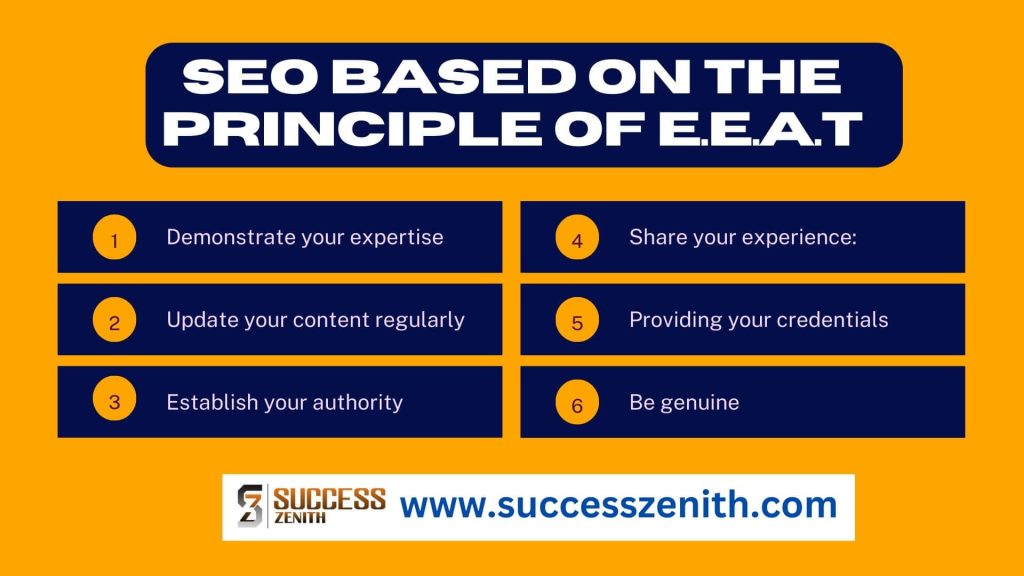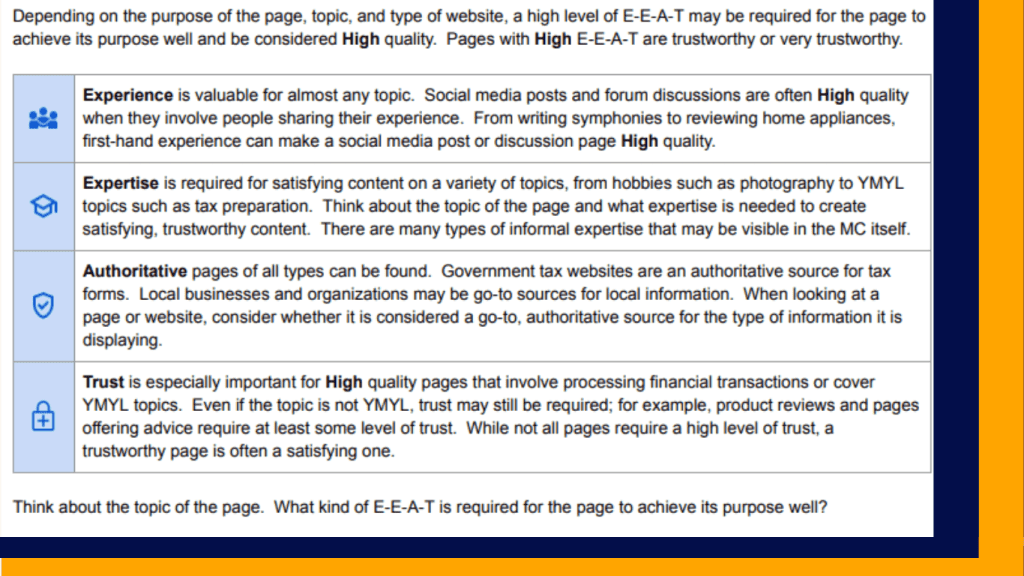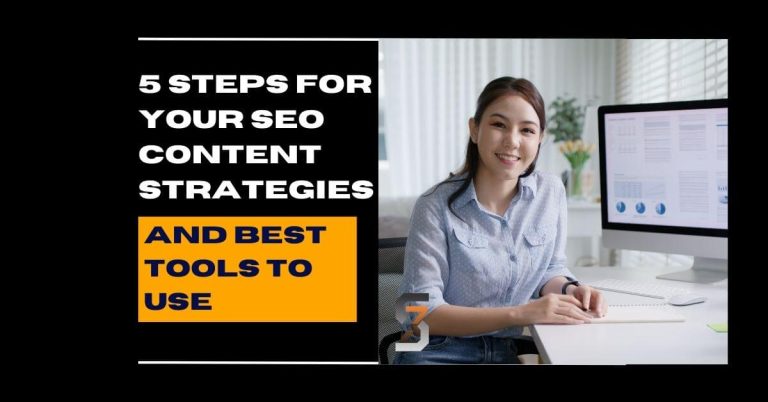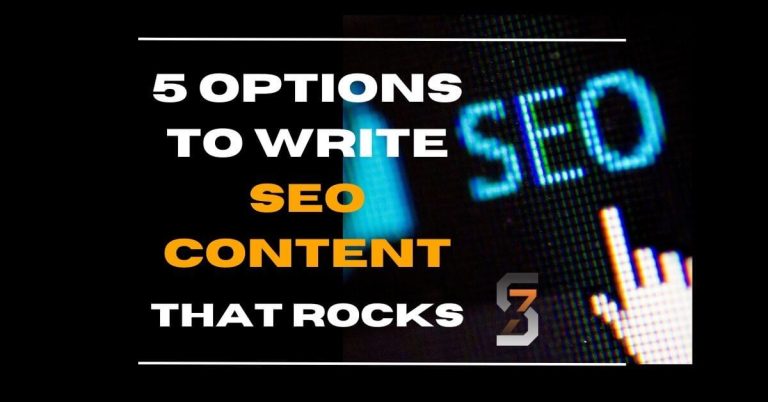Please Follow us on social media >>>>
SEO Based on the Principle of E.E.A.T
If you don’t know about Google’s E.E.A.T, you are missing out
E.E.A.T is becoming a household name among SEO enthusiasts. If you have not been interested in it, now is the time to show some interest.
Roll up your sleeve now and pay attention to SEO based on the principles of E.E.A.T especially if you are aspiring to boost your content quality and ranking with Google.

The first time I came across this abbreviation, I thought it was such a confusing concept, and I am not alone on that.
But in this article, I am showing you how to implement it in the simplest of ways.
E.E.A.T. stands for Experience, Expertise, Authoritativeness, and Trustworthiness. It’s a concept used by search engines, particularly Google, to evaluate the quality of content and websites.
I usually refer to E.E.A.T as the 4 letters that will make or break your content.
Here’s a simple breakdown of each component in the E.E.A.T concept:
- Experience: This refers to the firsthand knowledge or skills that a content creator has on a topic. For example, a travel blog written by someone who has actually visited the destinations discussed would have more experience than one who has not.
- Expertise: This indicates the level of knowledge a creator has in a specific field. For instance, a medical article written by a qualified doctor would be seen as more expert level than one written by an amateur.
- Authoritativeness: This relates to how recognized and respected a content creator or website is in their field. Websites that are frequently cited by others or have a strong reputation in a particular niche are considered more authoritative.
- Trustworthiness: This is about how reliable and safe a website is for users. Factors like secure connections (HTTPS), transparent information about the authors, and positive user reviews contribute to a site’s trustworthiness.
In short, E.E.A.T. helps ensure that your users receive high-quality, credible information, which is essential for effective SEO. Websites that demonstrate strong E.E.A.T. are more likely to rank higher in search results.
And in more recent times, Google added another one to it, called Experience. But they all point to the same thing, or almost the same thing: the quality you give to your audience.
Let’s be clear on this, this is not a direct ranking factor with Google.
Rather it is a framework that Google’s human quality raters use to assess how well the search algorithms are performing.
However, if you match your content with E-E-A-T principles, you will improve your chances of ranking higher and attracting more organic traffic.
Having said the above, I will now focus on explaining what E-E-A-T means, why it matters, and how you can optimize your content for it.
What is E-E-A-T?
E-E-A-T is an acronym and the meaning to each letter has been explained above.
Here is the thing: Google introduced this concept of E-E-A-T in its Search Quality Evaluator Guidelines, a document that provides instructions to human quality raters who evaluate the quality of web pages and provide feedback to Google.
According to Google, E-E-A-T is especially important for topics that have a high impact on the user’s happiness, health, safety, or financial stability.
These are known as Your Money or Your Life (YMYL) topics, and they include:
- Health and medical information
- Financial and legal information
- News and current events
- Shopping and e-commerce
- Education and learning
- Home and family
However, E-E-A-T is not limited to these topics. Google states that “experience is valuable for almost any topic” and that “all types of content benefit from E-A-T” ( QRG, page 62 ).

Why does E-E-A-T matter?
E-E-A-T matters because it reflects how Google wants to provide the best possible results to its users.
Google’s mission is to “organize the world’s information and make it universally accessible and useful”.
To achieve this, Google needs to ensure that the information it presents is not only relevant, but also high-quality, trustworthy, and helpful.
By following E-E-A-T guidelines, you can show Google that your content meets these criteria and deserves to rank well.
You can also build trust and authority with your audience, which can lead to more engagement, conversions, and loyalty, otherwise known as lead generation.
How to optimize your content for E-E-A-T
Optimizing your content for E-E-A-T requires a holistic approach that covers not only the content itself but also the content creator and the website.
Yes, you heard me right. Here are some tips to help you improve your E-E-A-T score:
Demonstrate your expertise:
Show that you have the knowledge and skill to create high-quality content on your topic.
You can do this by:
Providing your credentials, such as:
- degrees,
- certifications,
- awards, or
- publications.
Also, sharing your personal or professional experience will take you above the crowd. Share things like:
- stories,
- case studies,
- testimonials, or
- reviews.
You are the author of most things you say, but if you have something from reputable sources, do not fail to cite those.
When you refer, or link to authoritative sources, you are demonstrating your expertise too. And that is what Google is looking for.
You can cite sources such as research:
- papers,
- statistics, or
- experts.
Update your content regularly
Many people make the mistake of writing and leaving their content to take care of itself. This is wrong from all angles of SEO.
The reasons are: things are changing, information that is relevant yesterday may no longer be relevant today.
AI has come to stay; more tools and resources are sprouting by the day that may make what you wrote 2 weeks ago to be obsolete.
So, you need to keep your content fresh and up-to-date to reflect the latest information and trends.
You don’t need convincing to keep your content fresh. But if you do, here are 5 reasons to take it seriously:
5 advantages of fresh, up-to-date content on your website:
- Improved search rankings: Search engines favor fresh content.
- Enhanced user engagement: Current and relevant content keeps visitors interested and encourages them to spend more time on your site
- Establish your authority: By consistently providing updated information, your brand can position itself as a thought leader in your industry
- Better and increased social media engagement and sharing: Fresh content is more likely to be shared on social media platforms
- Ahead with competition: Nobody will spend time on any article that is more than 2 years old when there are current resources to provide better solutions.
Establish your authority
Since E.E.A.T and the additional E is all about what sets you apart, and what makes you authoritative, you need to establish this authority to get the smiles of Google and other search engines as well.
Show that you have the reputation and credibility to be a trusted source on your topic.
There are no 2 ways about it than by giving your audience the best of the best. You can do this by:
- Building your online presence, such as your social media profiles, guest posts, podcasts, or interviews.
- Getting positive reviews, ratings, or feedback from your customers, clients, or peers.
- Earning backlinks, mentions, or endorsements from authoritative websites or influencers.
- Displaying trust signals, such as logos, badges, awards, or certifications.
When you have done the above, take it further by enhancing your trustworthiness.
This is simpler to do than you think.
Start by showing your audience that your content and your website are accurate and reliable.
You can do this by:
✅Fact-check your content and correct any errors or inaccuracies.
✅ Give clear and transparent information about your website, such as
- Your contact details,
- Privacy policy,
- Terms and
- Conditions, or
- Refund policy. (You can check out this sample Refund Policy page)
✅ Invest in secure and encrypted connections, such as HTTPS, SSL, or TLS.
✅ Don’t engage in deceptive or misleading practices, such as clickbait, spam, or plagiarism.
How will people know what you, your business, your brand, and your website are worth if you don’t share it with them?
Increase your E.E.A.T effectiveness by sharing your experience:
Don’t know how to do it?
Here is a start:
Show that you have firsthand or life experience on your topic. You can do this by:
- Tell your personal story, such as how you learned, struggled, or succeeded on your topic.
- Share your insights, tips, or advice, based on your own experience.
- Show your results, outcomes, or achievements with evidence or proof.
- Engage with your audience, such as answering questions, soliciting feedback, or encouraging comments.
What have we talked about?
To optimize your content for E-E-A-T, you need to demonstrate your expertise, establish your authority, enhance your trustworthiness, and share your experience on your topic.
You also need to consider not only the content itself but also the content creator and the website.
E-E-A-T is not a onetime thing, but an ongoing process that requires constant improvement and adaptation.
Can you do it?
Yes!
By following E-E-A-T guidelines, you can create high-quality content that meets the needs and expectations of both Google and your audience.
What if you need help?
We are here to help you do the following:
- Write content that meets both the needs of your audience and E.E.A.T
- Edit your old posts and articles to reflect current trends and realities
- verify and make your content authoritative
- manage your social media accounts to stand above the competition
Get in touch now to get started with writing your business to success
My name is Echez O’ Ford, I help businesses take their message to the right audience the right way through well-researched and SEO-optimized content.
Feel free to hang out with me in any of the following:








